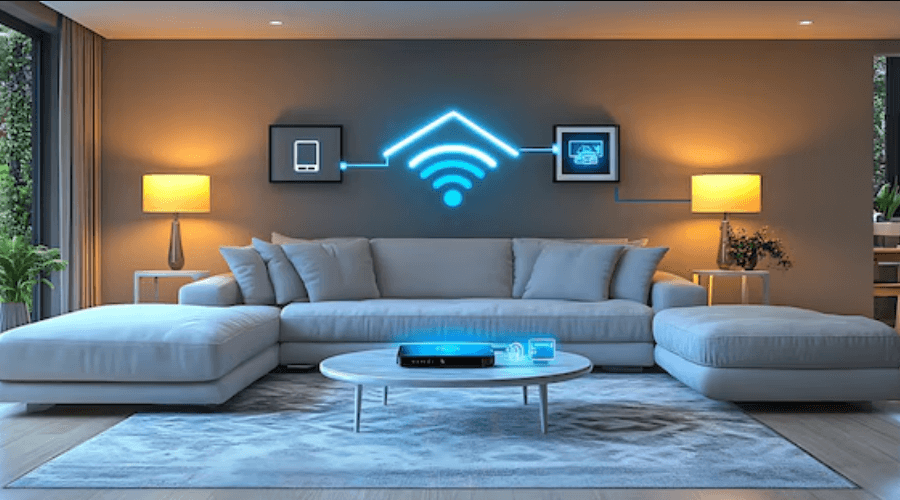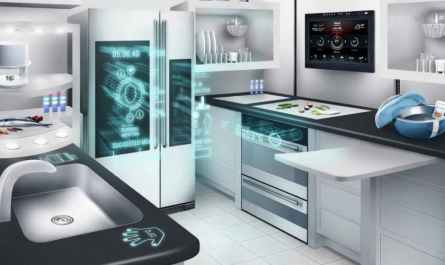The concept of a smart home has evolved rapidly over the last decade. What was once a futuristic dream is now an everyday reality, thanks to advancements in artificial intelligence (AI). In 2025, AI-integrated homes are no longer a luxury; they are a necessity, enhancing convenience, security, energy efficiency, and overall quality of life.
AI-powered homes learn user preferences, automate daily tasks, and provide personalized experiences, making life more seamless than ever before. This article explores how AI-integrated homes are revolutionizing modern living, the latest smart home technologies, and what homeowners can expect in the future.
The Rise of AI-Integrated Homes
AI-driven smart homes leverage machine learning, voice assistants, IoT (Internet of Things), and automation to create an environment that adapts to the homeowner’s needs. These homes go beyond basic smart thermostats and voice-activated lights—they integrate deeply with daily activities, offering:
-
Predictive automation for household tasks.
-
Enhanced security with AI-powered surveillance.
-
Energy savings through intelligent consumption monitoring.
-
Personalized entertainment experiences.
Key AI-Powered Features in Smart Homes
1. AI-Powered Virtual Assistants
In 2025, AI-driven virtual assistants like Amazon Alexa, Google Assistant, and Apple’s Siri have become smarter and more intuitive. These assistants can:
-
Manage schedules and set reminders.
-
Control lighting, temperature, and appliances.
-
Provide real-time updates on traffic, weather, and news.
-
Answer complex questions using AI-enhanced contextual learning.
Unlike earlier versions, these assistants now predict user needs, proactively suggesting actions based on past behaviors and interactions.
2. AI-Enhanced Home Security Systems
Home security has drastically improved with AI-powered surveillance cameras, facial recognition, and biometric authentication.
-
Smart doorbells use AI to differentiate between family members, friends, and strangers.
-
Advanced motion detection distinguishes between human activity and pets or moving objects.
-
Automated emergency responses contact authorities when suspicious activity is detected.
-
Cybersecurity integration protects smart home devices from hacking attempts.
These AI-driven security systems provide peace of mind by proactively preventing threats rather than just reacting to them.
3. AI in Home Energy Management
AI-integrated homes use machine learning algorithms to monitor and optimize energy consumption.
-
Smart thermostats like Nest AI adjust temperature based on user preferences and weather patterns.
-
AI-powered solar panels and energy grids optimize energy storage and reduce reliance on traditional power sources.
-
Smart lighting systems automatically dim or turn off lights when rooms are unoccupied.
The result? Lower electricity bills, reduced carbon footprints, and a more sustainable lifestyle.
4. AI-Powered Smart Kitchens
AI has transformed kitchens into intelligent culinary spaces.
-
Smart refrigerators track food expiration dates, suggest recipes, and even order groceries automatically.
-
AI-powered ovens adjust cooking temperatures based on the type of food.
-
Voice-controlled coffee makers and blenders make morning routines seamless.
-
Smart nutrition assistants analyze diet preferences and suggest healthier meal plans.
AI in the kitchen means less food waste, better health, and more efficient meal prep.
5. AI in Home Healthcare
With the rise of AI-integrated homes, health monitoring has moved inside the household.
-
Wearable AI health trackers integrate with smart home systems to monitor vital signs.
-
AI-driven medical alert systems detect falls and irregular health patterns.
-
Smart medication dispensers remind users when to take prescriptions.
-
AI-powered air purifiers adjust settings based on indoor air quality, reducing allergens and pollutants.
This technology benefits seniors, people with chronic illnesses, and individuals focused on wellness.
6. AI-Integrated Entertainment & Smart Living Rooms
Entertainment has reached a new level with AI-driven home theater systems, smart TVs, and personalized streaming experiences.
-
AI-powered TVs suggest content based on user preferences.
-
Smart speakers with AI create immersive surround sound experiences.
-
Voice-activated gaming consoles enhance hands-free gaming.
-
AI-driven mood lighting syncs with movies, music, or video games.
With AI, entertainment is not just passive—it’s personalized, interactive, and adaptive.
7. AI and Smart Home Cleaning
Cleaning has never been easier, thanks to AI-powered robotic vacuums and smart appliances.
-
Robotic vacuum cleaners (like Roomba AI) map home layouts and clean efficiently.
-
AI-powered washing machines and dryers optimize water and energy usage.
-
Smart dishwashers detect food residue levels and adjust settings accordingly.
These AI-driven appliances reduce the burden of daily chores, giving homeowners more free time for important activities.
The Future of AI-Integrated Homes
As AI technology continues to evolve, smart homes will become even more intuitive, self-sufficient, and efficient. Here’s what the future holds:
1. Fully Autonomous Homes
By 2030, AI-powered homes could operate entirely without human intervention—adjusting climate, security, cleaning, and even grocery shopping based on predictive AI models.
2. AI-Enhanced Sustainability
Homes will leverage AI for:
-
Smart water conservation systems.
-
AI-controlled solar energy grids.
-
Eco-friendly smart materials that adjust to temperature changes.
3. AI and the Metaverse
The integration of AI and metaverse technologies will allow homeowners to control smart homes in virtual environments. Imagine adjusting your home’s temperature or security settings from a VR headset while traveling.
4. AI-Driven Home Customization
Home interiors will be adaptive—AI will adjust furniture placement, lighting ambiance, and even wall colors based on mood and activities.
Challenges and Considerations
Despite the convenience, AI-integrated homes come with challenges:
-
Privacy concerns: AI collects vast amounts of user data—ensuring strong cybersecurity is crucial.
-
High initial costs: AI-powered smart home setups can be expensive, although long-term savings offset these costs.
-
Dependence on technology: If AI systems fail, homeowners may need manual backups.
Final Thoughts
AI-integrated homes are revolutionizing daily living by making homes smarter, more secure, and energy-efficient. From AI-powered assistants and home automation to smart kitchens and healthcare monitoring, these technologies are transforming the way we interact with our living spaces.
By 2025, AI-driven smart homes will be the standard, enhancing convenience, sustainability, and overall quality of life. Whether you’re considering upgrading your home or investing in smart technology, now is the perfect time to embrace AI-powered living.







